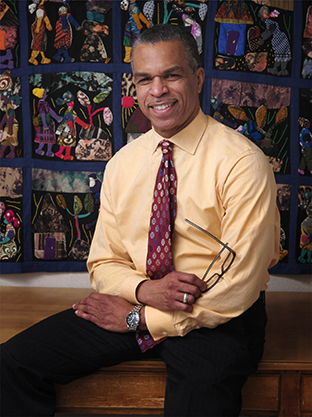Drexel Professor to Discuss Effects of Constant Trauma on Young Men of Color
December 8, 2016
 John Rich, MD As a part of the Robert Wood Johnson Foundation’s “Forward Promise” webinar series, Drexel University’s John Rich, MD will discuss a disturbing trend in how many people perceive violence experienced by boys and young men of color: That the victims are at fault.
John Rich, MD As a part of the Robert Wood Johnson Foundation’s “Forward Promise” webinar series, Drexel University’s John Rich, MD will discuss a disturbing trend in how many people perceive violence experienced by boys and young men of color: That the victims are at fault.
Rich, a professor of Health Management and Policy in the Dornsife School of Public Health and director of the Center for Nonviolence and Social Justice, will discuss the effects of this trend on public health during the episode that will air from 3–4 p.m., Monday, Dec. 12.
“I’m really going to be discussing how we focus on decreasing violence and, more than that, focusing on healing from it,” Rich explained.
Current figures from the Centers for Disease Control and Prevention (CDC) show that the death rate for black males between 10 and 25 years old is 18 times higher than the rate for white males in the same age range (50.7 deaths per 100,000 people versus 2.75 per 100,000). Hispanic males in the same age range also had an elevated risk, as they’re more than three times as likely to die than white peers (10 out of 100,000).
Nonfatal violence was also experienced at a higher rate by males of color, with black males in the 10–25 age range three times as likely to be injured as white males, and Hispanic males 1.5 times as likely.
All of this violence can lead to significant trauma-related issues. With young men so often caught in cycles of violence, they often develop trauma-related illnesses, the most recognizable being post-traumatic stress disorder (PTSD).
Public health concerns arise for the constant violence faced by these boys and young men of color. Research shows that experiencing adversity before age 18 — including such traumatic events as violence — is a very good predictor of chronic health conditions such as heart disease, obesity, diabetes, cancer, and depression.
“Childhood adversity might be the major public health issue of our time,” Rich said.
“We shouldn’t be asking what is wrong with these people, but rather what happened to them,” Rich said. “It’s about what can we do to help them heal and understand how trauma may have shaped their experience that led to this.”
To watch Rich’s webinar, Boys and Young Men of Color: Facing Trauma, Finding Healing and Wellbeing: register here.
Drexel News Blog: https://newsblog.drexel.edu/2016/12/05/talking-it-out-constant-trauma-and-its-effect-on-young-men-of-color/